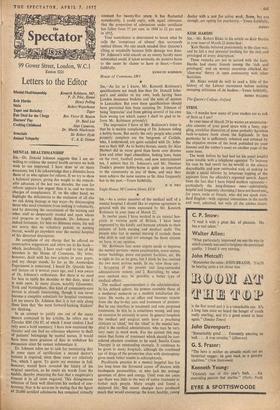Sin,—As a senior member of the medical staff of a
mental hospital I should like to express agreement in general with the views expressed by Mr. Kenneth Robinson in your issue of March 22.
In twelve years I have worked in six mental hos- pitals in various parts of Britain. I have been impressed by the kindly and humane attitude to their patients of both nursing and medical staffs. The people who last in mental nursing (I exclude those who drift in and out) are amongst the finest citizens we have, in my opinion.
Mr. Robinson lists some urgent needs to improve the mental services—more psychiatrists, more nurses, better buildings, more out-patient facilities, etc. He is right so far as he goes, but I think he has omitted the two most serious needs. In my view these are ; 1. Scrapping of the present and long-outmoded administrative system; and 2. Recruiting, by what- ever method may be possible, a better type of Medical officer.
The medical superintendent is the administration. In his defined sphere, his powers resemble those of a medieval monarch or a modern totalitarian dic- tator. He works in an office and becomes remote from the day-to-day care and treatment of patients. But he can interfere in treatment and veto proposed treatments. In this he is sometimes wrong, and may on occasion be seriously in error. In general hospitals the medical and surgical units have a practising clinician as 'chief,' but the 'chief' in the mental hos- pital is the medical administrator, who may be very, very rusty in ward work. For the patient this may mean that forms of treatment which should be con- sidered obsolete continue to be used. Insulin Coma Therapy is an outstanding example. It continues to be given in many hospitals, although the combined use of drugs of the promozine class with electroplexy gives much better results in schizophrenia.
Psychiatric practice in a mental hospital has for too long been the favoured career of doctors with inadequate personalities, or who lack the average quantum of drive and energy. Until even ten years ago there was little in the way' of active treatment to bother such people. Many sought and found a sheltered life. But recent changes have produced much that would encourage the keen, healthy, young
doctor with a zest for active work. Some, but not enough, are opting for psychiatry.—Yours faithfully,
HANNO












































 Previous page
Previous page